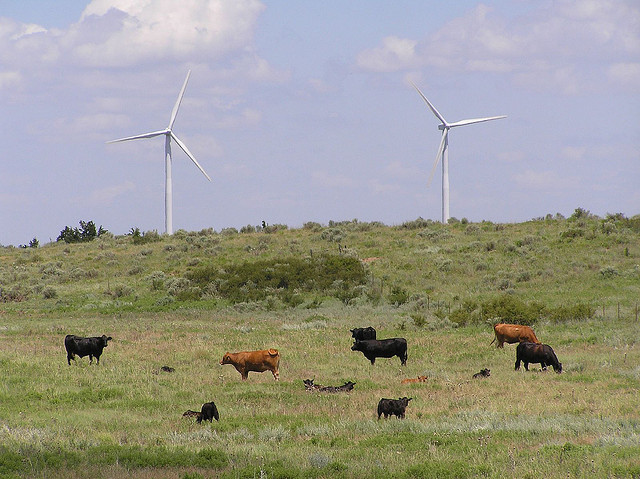Ranchers Might Push Lawmakers to Give Wind and Solar Same Property Rights as Oil and Gas
-
Joe Wertz

Becky McCray / Flickr
A wind farm near Woodwoard and Harper Counties in northwestern Oklahoma.
The Oklahoma Cattlemen’s Association might push Oklahoma legislators to extend some of the rights afforded oil and natural gas properties to alternative forms of energy like wind and solar, the Journal Record’s Brian Brus reports:
President Charlie Swanson said the organization’s executive committee is looking into government business incentives for alternative energy development and asking some tough questions about parity for ag producers: Can wind-generation rights be severed from the surface of property, for example, allowing a greater range of royalty deals with landowners, energy producers and third parties? The topic was at the top of the list of new resolutions for consideration at the annual OCA convention and trade show held in Norman.
“We’re looking at tax incentives that the wind industry gets for putting up turbines and how they affect ag producers and whether they get any money out of the use of their property aboveground,” Swanson said. “We’ve had some discussion about solar panels as well. If I own the land, should I receive some benefit from solar energy generated there? It’s a complex issue that deserves attention.”
In Oklahoma, oil and natural gas properties can be split off — or severed, as it’s known — from surface lands. Airspace for commercial wind and solar systems, however, cannot be separated from surface properties due to the Airspace Severance Restriction Act, which went into effect in 2010.
Leasing arrangements may be made only with the legally authorized owner of the surface estate, the law states, although domestic uses by the landowner are allowed.
“Legislators wanted to make sure that surface rights owners receive the benefit of payments because they also bear the costs of any negative impact from the project,” said Shannon Ferrell, a professor of agricultural law at Oklahoma State University. “It seemed most fair that we tie benefits to burdens.”
